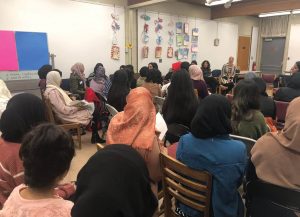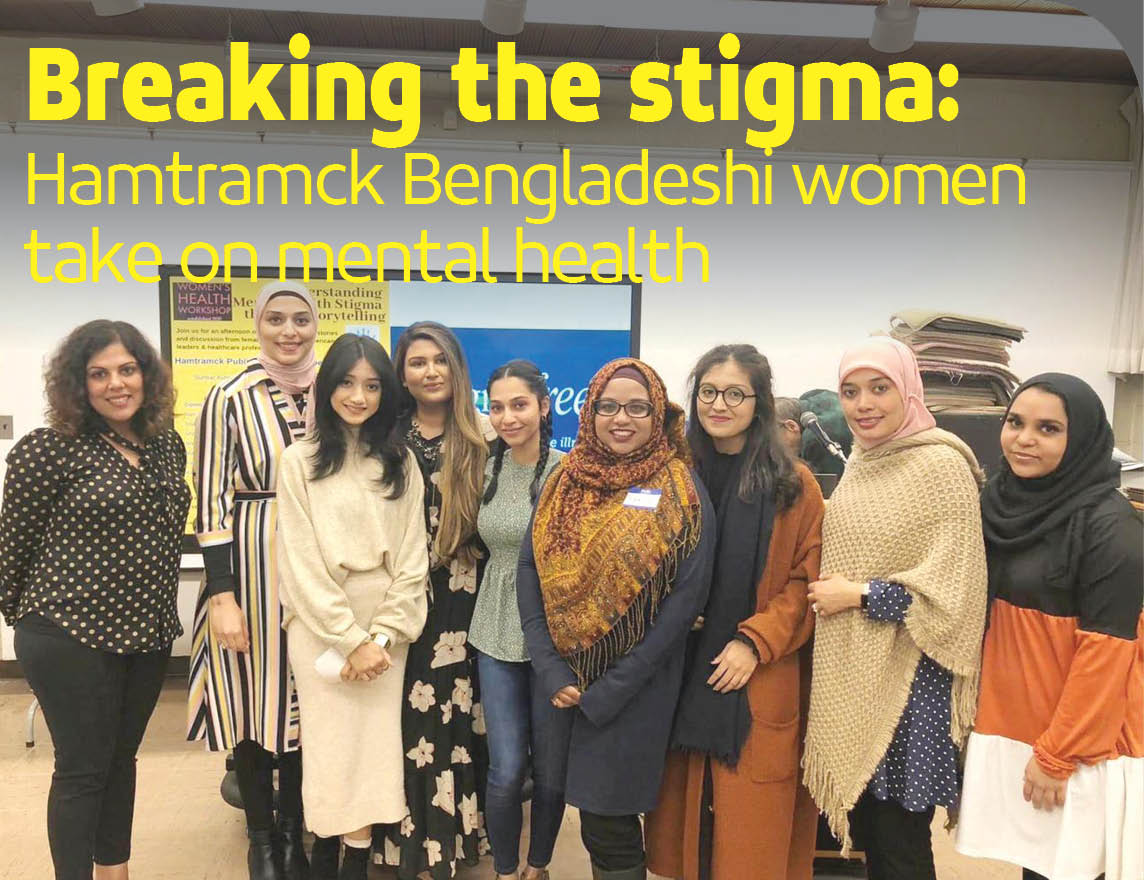By Nargis Rahman – YAN – Hamtramck
 Yasmeen Ahmed of Hamtramck was 5-years-old when her brother was diagnosed with paranoid schizophrenia. He was 15-years-old. “This took a huge toll on my family,” said Yasmeen. Her mother started driving, sometimes hours, to educational workshops with Yasmeen. Her brother was institutionalized for a period of time. “If we knew what we know, know, we could’ve helped him,” she said.
Yasmeen Ahmed of Hamtramck was 5-years-old when her brother was diagnosed with paranoid schizophrenia. He was 15-years-old. “This took a huge toll on my family,” said Yasmeen. Her mother started driving, sometimes hours, to educational workshops with Yasmeen. Her brother was institutionalized for a period of time. “If we knew what we know, know, we could’ve helped him,” she said.
Yasmeen was one of the six Bangladeshi storytellers at the Women’s Health Seminar held at the Hamtramck Public Library on Oct. 26 to educate Bangladeshi women about mental health and stigma. The initiative is one-of-a-kind for the women in the Bangladeshi community, who are often left out of the conversations when it comes to preventative health education. This event came a week after mental health awareness week, October 6-12. Over 50 women were in attendance.
According to the World Health Organization reports, “Around 1 in 5 of the world’s children and adolescents have a mental disorder.”
Event organizer, Subha Hanif, said the seminar is part of the ongoing health workshops held for Bangladeshi women in Hamtramck and Detroit designed to fit the cultural needs of the community with Bangla translators, prayer breaks, and lectures by female physicians. “Many women were hesitant or uncomfortable to ask certain women’s health-related topics in front of the opposite gender,” said Subha.
The mental health seminar used the tool of storytelling to create a safe environment for people to share personal stories of healing and triumph or the nuances of caring for loved ones who may have a mental disorder, like Yasmeen’s brother.
“Put yourself in their footsteps. Your own mind and body can’t understand itself,” said Yasmeen. She said her brother’s diagnosis helped her family spend more time together engaging in discussions and fun activities. Yasmeen is pursuing a career in clinical psychology and art therapy to help others.
In the South Asian community, the leading reason people are not getting help is the stigma around mental health said Saniyah Shahid, a social worker and therapist who specializes in anxiety, anger, and OCD. “Stigma is what others have on you and you on yourself. Be comfortable about yourself so you can educate yourself and learn from each other,” Saniyah said. “Break your silence.”
According to the Anxiety and Depression Society of America, “Asian-Americans report fewer mental health conditions than their white counterparts…There are several barriers to this population seeking help from mental health professionals, including language barriers, stigma, and lack of awareness of resources and mental health services.”
Saniyah said finding a therapist who creates a “safe nonjudgmental environment” is important. “You matter. You deserve the best. In order to love somebody else, you have to love yourself,” she said.
The speakers said due to stigma, people do not share mental health concerns with friends or family, leading to isolation due to shame. This can further increase symptoms and people suffer in silence.
Namira Islam is an attorney and co-founder of MuslimARC, a human rights education organization that works to raise awareness and educate Muslims on racial justice. Namira said Asian Americans are thought to be “model minorities” who work hard and get far. She said this stereotype may deter people to seek mental health services, personally and professionally. “Even if nobody else is there for you, you are somebody,” said Namira.
People don’t realize that anxiety takes on physical forms such as fainting, dizziness or numbness from trauma, said Sunbal Ashraf, a psychiatrist resident at Wayne State University. “Be comfortable with your own weaknesses and emotions,” she said.
Kaniz Chowdhury, a criminal justice and political science major at Wayne State University, knows this all too well. Kaniz experienced an irregular menstrual period that lasted for months. When she approached her parents, they took her to the doctor, who downplayed the matter until Kaniz requested to see an OBGYN. Her parents put her on homeopathic medicine rather than allowing her to take birth control to regulate her period due to social stigma. The medicine made her more ill. After fainting on the stairs at school, she realized her health was taking a physical and mental toll. Kaniz sat her parents down and had the uncomfortable conversation about allowing her to take the medication that would help her heal. She encourages women to be their own advocates for their health and well-being.
Shamsun Nehar, an engineer and owner of CakesByLucky said mental illness can, “Break your confidence,” due to the double standards with education, relationships, and responsibilities on women. She said we need to do a better job of educating ourselves and our families to dispel the myths of mental health, culturally thought to be negative, taboo, black magic or possession. “Find a solution. Try to do something about it,” she said.
The Women’s Health Seminar is part of a series created through the Bangladeshi Americans for Social Empowerment (BASE) established by Mr. Abu Hanif in 2011. After his passing, his daughter Subha and family have taken the lead to host the workshops.
Subha said Bangladeshis lack resources for preventative health education. “Many people were going to the free clinics and getting their blood drawn, blood sugar checked, blood pressure measured and being told by the technician or doctor that they had abnormal values but there was no emphasis on preventative health education.”
Subha works with professionals and health care providers to bring these disparities to light. She hopes to have the mental health seminars on a tri-monthly basis, with various styles of workshops ahead. For more information about upcoming seminars, contact subhahanif@gmail.com.












